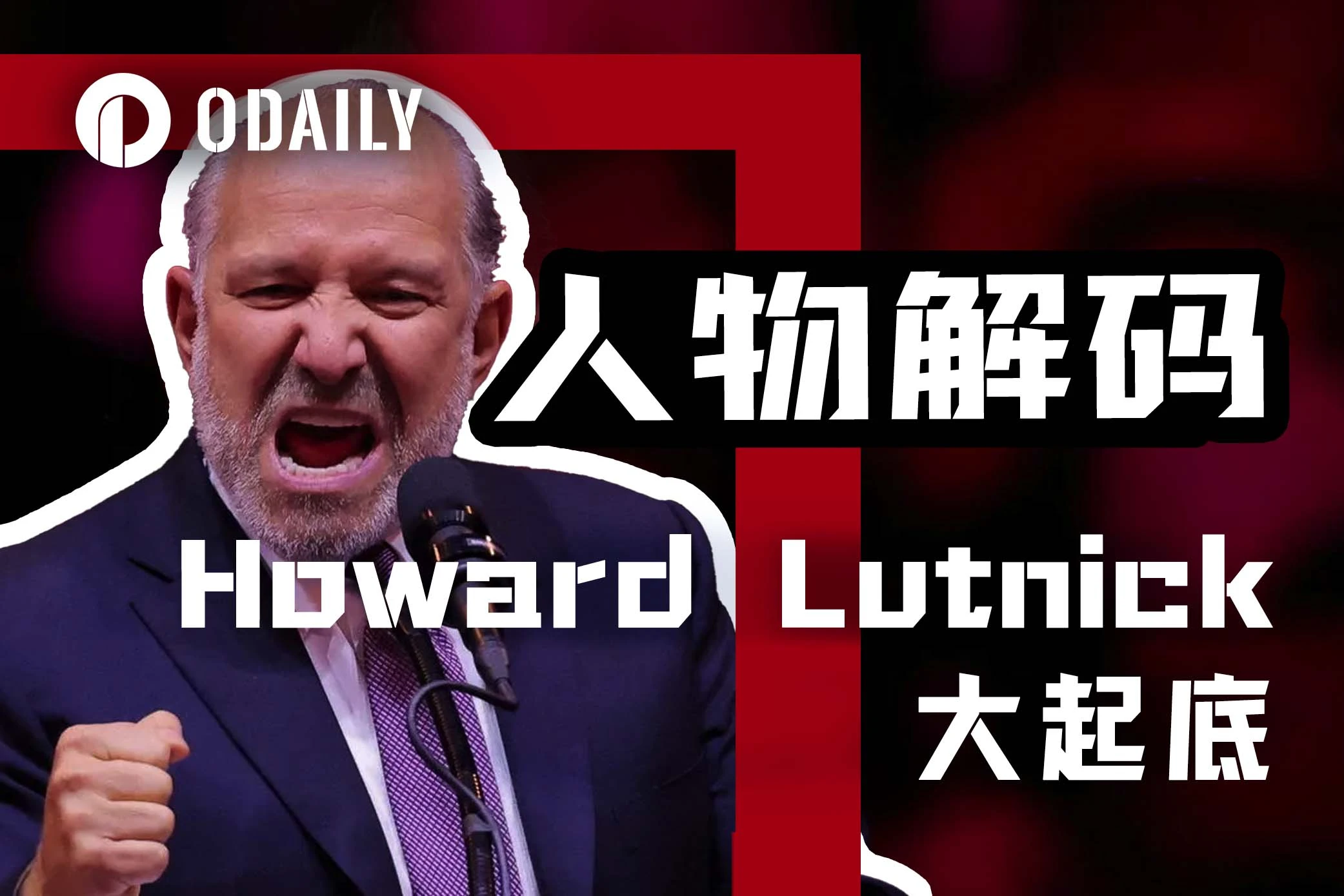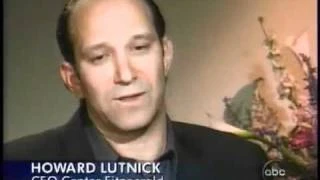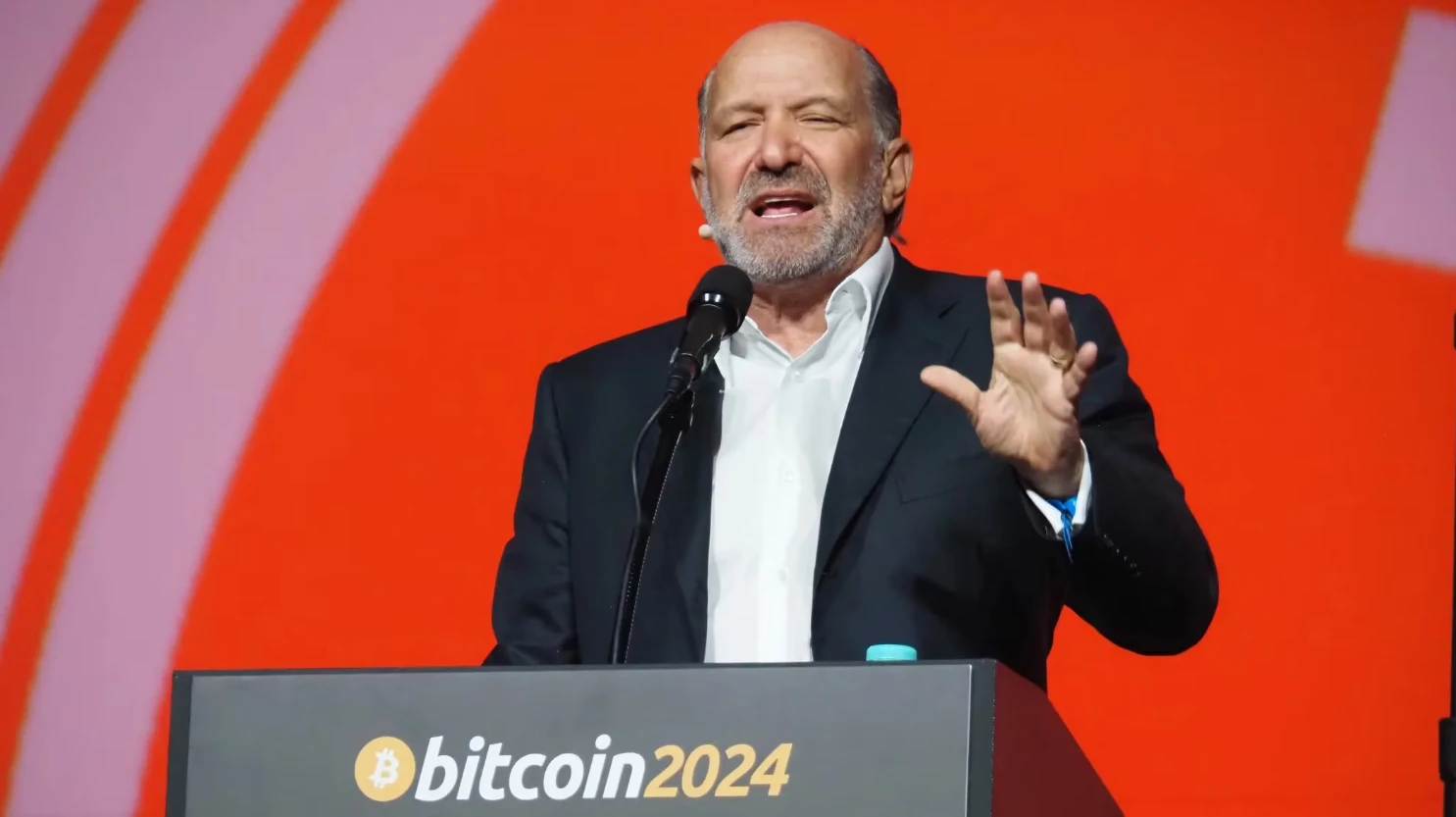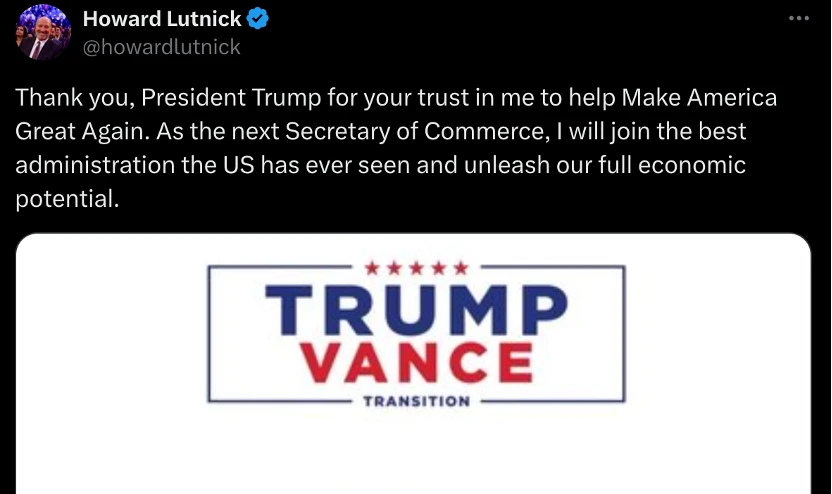Original | Odaily Planet Daily
Author | jk

On November 19, local time in the United States, the soon-to-be President Trump announced a new cabinet nomination: he nominated Howard Lutnick, CEO of Cantor Fitzgerald, as the new Secretary of Commerce. Previously, he was one of the candidates for Secretary of the Treasury (with a 9% election probability in the related pool on Polymarket yesterday).
In a statement, Trump said that Lutnick would lead all matters related to tariffs and trade in the United States. As for the role of Secretary of Commerce, he will oversee all major responsibilities of the Department of Commerce: funding new chip factories, implementing trade restrictions, releasing economic data, and even monitoring the weather. He is also one of the co-chairs of Trump's transition team, tasked with filling about 4,000 government positions before the presidential inauguration.
According to procedural rules and past experience, it will take 2 to 4 months of background checks and Senate voting confirmation from the time of presidential nomination to final appointment.
The most relevant aspect to the crypto world is that Howard Lutnick, as CEO, manages over half of the reserves behind Tether. (Odaily previously reported that the $39 billion USDT reserves (U.S. Treasury bonds) of the stablecoin issuer Tether are managed by Wall Street bond trading giant Cantor Fitzgerald.) Tether reported earlier this week that as of the end of 2022, its assets amounted to $67 billion. Tether has also become the "unstoppable cornerstone of the crypto world" due to its leading market share in stablecoins._
So, how solid is Howard Lutnick's background? What is his relationship with Trump and Musk? What statements or initiatives has he made regarding the crypto industry? Odaily Planet Daily will detail Howard Lutnick's story in this article.
Orphan, Young CEO, 9/11 Survivor
Howard Lutnick's early life was not happy.
He was born on July 14, 1961, in Jericho, Long Island, as the second of three siblings, in a family that practiced Judaism. His father was a history professor at a university, and his mother was a painter and sculptor. Unfortunately, his parents both died of cancer when he was around 18, leaving the family with a significant amount of debt. At that time, Howard was just a freshman in college and had to start dealing with lawyers to properly arrange the debts left by his father; if it weren't for his college, Haverford College (a prestigious liberal arts college in the U.S.), offering him a full scholarship after hearing about this, he might not have been able to complete his college education.
In 1983, Howard Lutnick graduated from Haverford with a degree in economics and immediately joined Cantor Fitzgerald.
Founded in 1945, Cantor Fitzgerald is a financial services company focused on institutional equity, fixed income sales and trading, and also involved in consulting, asset management services, gaming technology, and e-commerce, with over 5,000 institutional clients.
Through a series of profitable trades, he won the favor of the company and quickly established a strong mentor relationship with the company's founder, Bernard Cantor. Howard later described his rise by saying: “The first time I helped him make $100 million, he liked me; the second time I made $100 million, he fell in love with me; the third time I made $100 million—we became family.”
In 1991, Howard was appointed President and CEO of the company. At that time, he was only 29 years old.

Early photo of Howard Lutnick. Source: Youtube
However, Cantor Fitzgerald's office was located on the 105th floor of the North Tower of the World Trade Center. On the day of the 9/11 attacks, Howard was dropping his son off at preschool and was therefore late; but as he rushed to the office, he saw the twin towers billowing thick smoke. His brother, Gary Lutnick, and 658 of Cantor Fitzgerald's 960 employees lost their lives in that day's terrorist attack.
We can only speculate how Howard faced this tragedy afterward, gleaning some clues from interviews. According to The Economist, for the next three years, he "cried almost every day," even tearing up during numerous television interviews. Initially, the media expressed sympathy and praised him, but a few days later, they began to harshly criticize him for not distributing salaries to the families of the deceased employees, calling him heartless, hypocritical, and sensationalist. He insisted he had no choice: “It’s just a math problem… the company simply had no money.” In the following five years, he donated about a quarter of what remained of the employees' salaries to the victims' families' fund. As time passed, the company revived. He said his employees “stitched his soul back together.”
Fortunately, in 1999, Howard pushed for the IPO of Cantor Fitzgerald's electronic trading subsidiary, eSpeed. This electronic trading system did not require brokers, which was one of the key reasons Cantor Fitzgerald survived the 9/11 attacks. Due to the loss of a large number of employees, they were forced to adopt electronic trading, replacing the traditional operations of the Treasury bond market.
According to the Associated Press, in 2013, Cantor Fitzgerald reached a $135 million settlement with American Airlines and insurance companies over lawsuits related to death and personal injury. Howard stated at the time: “We can never, and will never, view this event as ‘ordinary.’ For us, there are no words like ‘ordinary,’ ‘fair,’ or ‘reasonable’ to describe this settlement. All we can say is that this matter is legally concluded.”
When nominating Howard Lutnick as Secretary of Commerce, Trump mentioned this tragedy, calling him “the embodiment of resilience in the face of unspeakable tragedy.”
Musk Supports His Appointment as Treasury Secretary, but He Became Commerce Secretary
As a billionaire, his statements often lean towards traditional American blue-collar workers. During the campaign, Trump proposed a 60% tariff on Chinese imports and a maximum 20% tariff on all other U.S. imports. Howard explicitly supported this plan in a September interview with CNBC, stating: “Tariffs are a great tool for the president to use—we need to protect American workers.”
He is also a staunch supporter of the MAGA movement. Howard is one of the main fundraisers for Trump's 2020 and 2024 presidential campaigns. He has hosted fundraising events at his Manhattan home and publicly supported Trump's policies.
In October 2024, Lutnick spoke at a Trump rally at Madison Square Garden, emphasizing the strong performance of the U.S. economy in 1900 and advocating for the restoration of high tariffs and no income tax policies. Howard claimed, he misses the time in America when there was no income tax.
In 2022, he pushed for the IPO of the right-wing video platform Rumble, providing a platform for public figures rejected by mainstream tech giants to voice their opinions. “This is a return to free speech on the internet,” he said. “We just want the America we are growing up in.”
Previously, billionaire Elon Musk and others in Trump's circle called for Trump to abandon the original popular candidate for Treasury Secretary, Scott Bessent, and instead support Howard. Musk stated in a post: “Bessent is a ‘business as usual’ choice, while Howard Lutnick will truly drive change.”
However, in the end, Howard Lutnick did not become Treasury Secretary but was nominated as Secretary of Commerce. (Further reading: “Focusing on the Nomination of U.S. Treasury Secretary, Can the Crypto Industry Welcome a New Ally?”)
Howard Lutnick's Comments on Crypto
Howard Lutnick and his company's relationship and support for crypto are substantial. In a podcast interview with CNBC last year, he stated: “I am a supporter of cryptocurrency, but I am very clear: Bitcoin is just Bitcoin. Other tokens are not worth mentioning.” He also added: “I am very supportive of a stablecoin called Tether.”
Previously, he stated at a Bitcoin conference: “Bitcoin is like gold and should be freely traded anywhere in the world. As the largest wholesaler in the world, we will do everything we can to achieve this goal. Bitcoin should be traded globally without exception or restriction, just like gold.”

According to Coindesk reports, his company is not only the manager of Tether's reserves, jointly handling U.S. Treasury bond trading; Cantor Fitzgerald recently announced a Bitcoin financing business, planning to provide leverage for Bitcoin investors, with initial funding of up to $2 billion.
In a recent post on X, Howard said: “Thank you, President Trump, for trusting me to help achieve the goal of ‘Making America Great Again.’ As the next Secretary of Commerce, I will join the best government team in American history to fully unleash our economic potential!”

Source: X
免责声明:本文章仅代表作者个人观点,不代表本平台的立场和观点。本文章仅供信息分享,不构成对任何人的任何投资建议。用户与作者之间的任何争议,与本平台无关。如网页中刊载的文章或图片涉及侵权,请提供相关的权利证明和身份证明发送邮件到support@aicoin.com,本平台相关工作人员将会进行核查。



